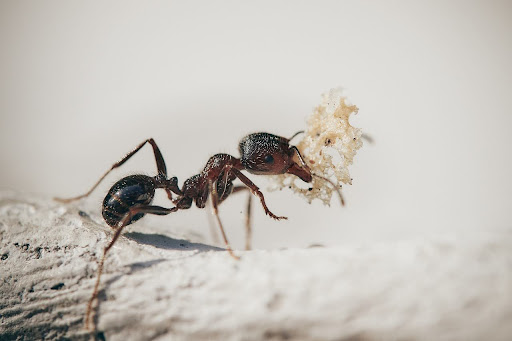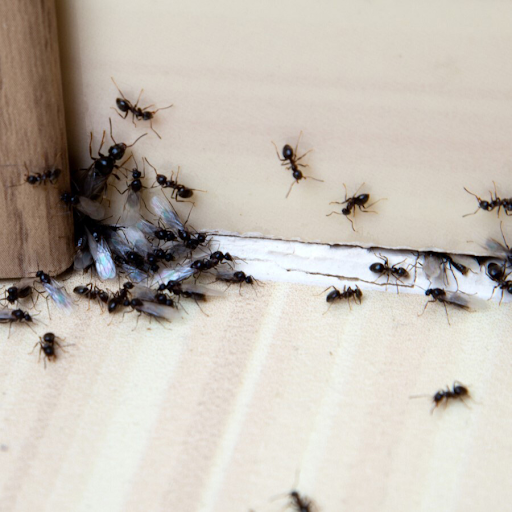Because your home has everything ants want, from food to water, and shelter.
That’s the short answer.
But if you’re seeing tiny ants marching across your benchtop or around the pet food bowl, there’s more going on under the surface.

At Allstate Pest Control, we’ve been helping South Australians tackle pest infestations for over 35 years. We handle emergency call-outs, long-term treatments, and prevention plans for both homes and businesses. And when it comes to ant control, we’ve seen it all, from sugar trail scouts to full-blown carpenter ant infestations hiding behind the wall.
Let’s help you find out why ants invade homes, what attracts ants inside, and how you can stop ants from coming back.
Why Do I Keep Getting Ants in My House?
Because they’ve found a food source or water, and told their colony.
Ants don’t wander in randomly. Worker ants go out to search for food or moisture. Once they find something, like a crumb, a leaky pipe, or a pet bowl, they leave behind a chemical trail. This trail guides the other ants directly to it.
Most ants come inside looking for:
- Sweet foods (think honey, sugar, juice spills)
- Greasy leftovers or meat scraps
- Water from leaky taps, condensation, or plant trays
- Shelter from rain or extreme heat
Why Do Ants Come Inside When It’s Hot?
During hot seasons, such as summer, ants are more likely to invade homes.
Why?
When it’s hot and dry, ants come inside to escape the heat and search for water. Ant activity increases during warm months, especially for pavement ants and other ground-dwelling species common in Australia.
Once the colony finds a reliable food source, you’ll notice ants walking in steady lines across the floor, benchtop, or windowsill. That’s your cue to act fast.
What attracts ants inside the home?
Ants love it when you have a messy kitchen, dining room or living room in any form.
They’re drawn to sugary substances, food residue, and anything not appropriately sealed. Even the tiniest crumb under your toaster can be enough to trigger an ant infestation.
Here’s what attracts ants:
- Unsealed food like cereal, rice, or snacks
- Fruit left out on the counter
- Spills straight from soft drinks or juice
- Pet food bowls left out overnight
- Poorly sealed windows, cracks, or entry points
- Damp areas like under sinks or laundry rooms
Carpenter ants may also enter your home if there’s rotting or damp timber. Unlike other ants, they don’t eat wood, but they hollow it out to create nesting habitats.
How to Stop Ants from Coming Inside My House: 7 Things to Do

If you’ve had ants invading your kitchen more than once, it’s time to break the cycle. Here’s what to do.
Identify the type of ant
Different ants need different treatment methods. Some ants are sweet lovers.
Others prefer grease or protein. Some build nests in walls (like carpenter ants).
Others stay outdoors but forage inside. Identifying the ant species helps choose the right bait or barrier.
Keep surfaces clean
Wipe down benchtops after every meal. Mop floors regularly. Don’t leave dirty dishes overnight. Even a small spill can trigger an ant trail. Pay attention to hidden spots like under the fridge, toaster, or microwave.
Store food in sealed containers
Use airtight containers for sugar, beverages, flour, grains, and snacks. Don’t rely on cardboard packaging. Ants can chew through it. The same goes for pet food; store it in sealed containers and clean bowls daily.
Seal cracks
Inspect your walls, windows, doors, and skirting boards. Use sealant to block gaps. Fix poorly sealed windows or broken flyscreens. If ants are coming through a specific crack, you’ll often see them forming a line there.
Use ant baits
Ant bait is more effective than sprays in the long run. Worker ants carry the bait back to the colony. It poisons the entire nest over time.
Ensure the bait matches the ants’ food preference; some prefer protein, while others prefer sugar. Always follow the label instructions.
Use an ant spray barrier
Apply non-repellent ant spray along door frames, windows, and exterior walls. These products allow ants to walk through and carry the toxin back to the colony without alerting others.
Avoid strong-smelling repellents, as they can cause the ants to split and form new colonies.
Turn to pest control professionals
If ants keep returning, it’s time to call an ant control professional. At Allstate Pest Control, we use targeted treatments that prevente the entire nest, not just the visible ants. We also identify access points and prevent ants from coming back.
How Do I Know If I Have Termites or Ants?
Not all ants are harmless, and not every wood-loving insect is a termite.
If you see small piles of sawdust, hollow-sounding timber, or ants with wings, it could be something more serious. Carpenter ants are often mistaken for termites, but they don’t eat wood; they dig into it. Termites, on the other hand, feed on cellulose and cause structural damage.
A licensed pest control expert can confirm what pest you’re dealing with. Don’t guess, especially if you own a timber-framed home.
Frequently Asked Questions
Why are there ants in my house suddenly?
Ants appear suddenly when they discover food or water. Once a worker ant finds it, others quickly follow via a scent trail. This can happen within hours of a spill or leak.
What do ants hate most?
Ants dislike strong scents, such as lemon juice, peppermint oil, and vinegar. But these are only short-term deterrents. Professional pest control methods target the nest directly for more effective and longer-lasting results.
Does killing ants attract more?
Yes, in some cases. Crushing ants releases alarm pheromones that can attract other ants to the area. It’s better to use ant bait to target the entire colony discreetly.
Why are there ants in my room but no food?
Even if you don’t see food, ants may detect food residue, pet food, or moisture. Sometimes ants use rooms as pathways to other areas. Check windows, skirting boards, and power outlets.
How to manage ants when you don’t know where they’re coming from?
Start with deep cleaning. Remove all food sources. Use ant bait along ant trails or suspected areas. If the problem persists, contact a licensed pest control expert to locate the nest and apply a comprehensive treatment.
If ants have become a constant battle, don’t wait until the colony grows.
Call Allstate Pest Control on (08) 8371 1277 or send us a detailed message about the situation to book an inspection or emergency treatment. We’re trusted by thousands of South Australians, and we’re ready to help you protect your home.
